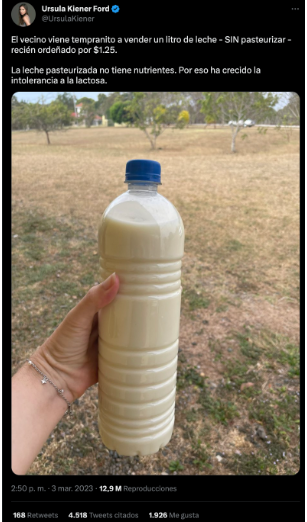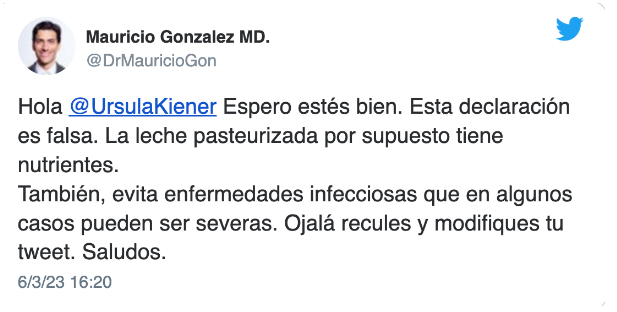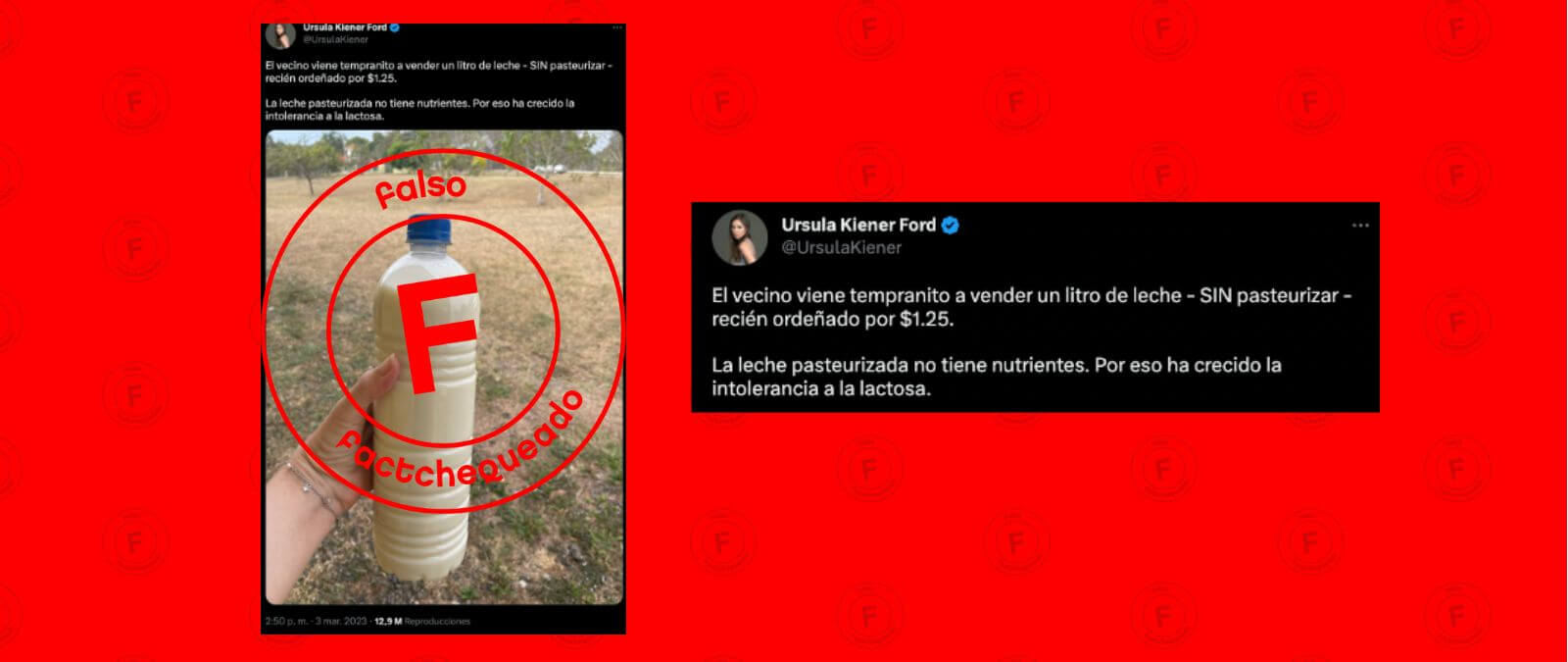“The neighbor comes early to sell a liter of milk- UNpasteurized - freshly milked from $1.25. Pasteurized milk has no nutrients. That is why lactose intolerance has grown”. This is what was stated in a tweet published on March 3, 3033, which has accumulated more than 12.5 million views (as of March 7). However, it is not true that pasteurized milk is nutrient-free, and it is not true that this is related to the general increase in lactose intolerance.

The consumption of raw milk is not safe
Raw milk, which is consumed when extracted directly from the corresponding animal (cow, sheep, goat…), without going through any type of process or heat treatment, is not safe: according to the United States Food and Drug Administration (FDA), “may harbor dangerous microorganisms that pose serious health risks”.
The United States Centers for Disease Control and Prevention (CDC) recall that even healthy animals may carry germs that can contaminate milk. “There is no substitute for pasteurization to ensure that milk is safe to consume”, they affirm.
It is to avoid such pathogens that milk goes through processes such as pasteurization (the result of which is known as fresh milk) or sterilization, in which it is put to a temperature increase that partially or completely eliminates, respectively, these contaminants.
What is pasteurized milk?
We refer to pasteurized milk if the drink has undergone a thermal process (it has been subject to a temperature of less than 100ºC for a certain time). This process manages to eliminate part of the microorganisms present in the milk, but it does not eliminate other substances, such as toxins or spores, resistant to heat. “For these reasons, pasteurized milk must be kept at refrigerated temperatures and only for a few days”, explains Spanish food technologist Miguel Ángel Lurueña in his blog.
Regarding this, it is not true that it “does not have nutrients”, as the viral tweet we refer to affirms. It is true that, when going through an increase in temperature, the final product may experience a small loss of certain types of vitamins, but they are minimal (between 0 and 10% in some such as B1 and B6 and between 10 and 25% in others such as B9, B12, or C).
When talking about proteins, a degree of denaturation (that is, the breaking of bonds that maintain their structures) of between 5 and 10% after pasteurization has been observed, but this does not have to be considered something negative: “In fact, it facilitates the access of digestive enzymes, improving their digestibility”, indicates the Center for Agricultural Research and Training (CIFA), in Spain. The FDA is clear about this: "Pasteurization does not reduce the nutritional value of the milk ”.
Milk pasteurization is not related to lactose intolerance
It is true that both raw milk and pasteurized milk can cause allergic reactions in people who are sensitive to milk proteins, but this is not a consequence of the pasteurization process, but of the components of the drink and the body of each person. As the FDA states on its website, “pasteurization of milk does not cause lactose intolerance or allergic reactions.” Lactose is a type of sugar found in milk and other dairy products. To digest it, the body needs an enzyme called lactase. When the small intestine does not produce enough of the latter, that is when we refer to lactose intolerance, which has nothing to do with the pasteurization process.
In the words of Gemma del Caño, specialist in Spain in the safety of the food industry, “eliminating the risk of food poisoning has been one of the great advances in history”: “With a little more information you would know that there is not a problem with nutrients and that it has nothing to do with lactose”, he added in response to the user of the tweet. From his point of view, one should not “presume to carry out demonstrably risky practices, even less giving incorrect information.”
Dr Mauricio González, with three medical specialties (internal, emergency and obesity medicine) and known on social networks as “Doctor Mau”, also responded to the tweet and was categorical: “This statement is false. Pasteurized milk of course has its nutrients. It also prevents infectious diseases that in some cases can be severe,” he said and invited the user to react.

Factchequeado is a means of verification that builds a Spanish-speaking community to counter misinformation in the United States. Do you want to be a part? Join and verify the content you receive by sending it to our Whatsapp +16468736087 o a factchequeado.com/whatsapp.









